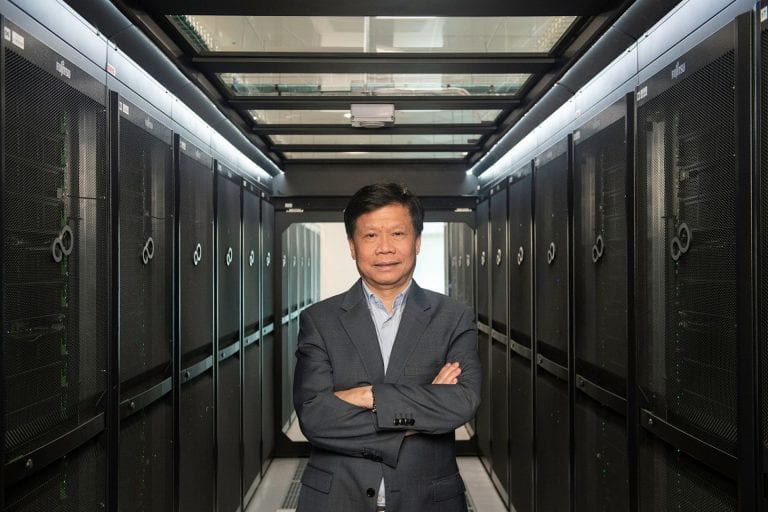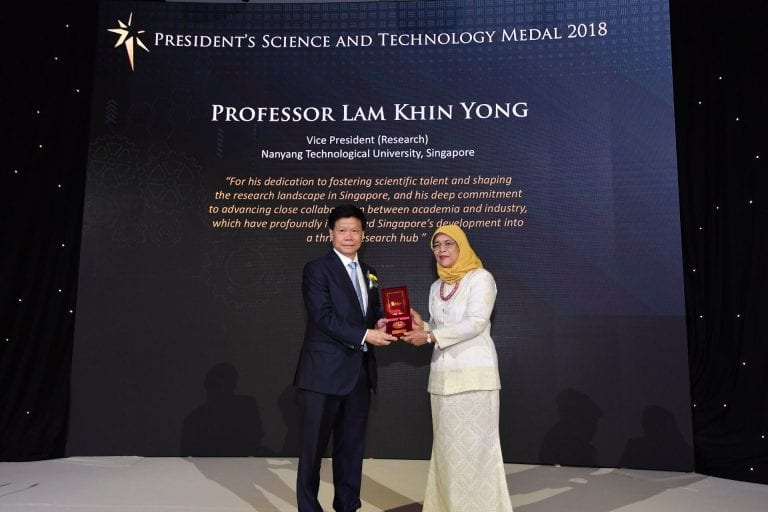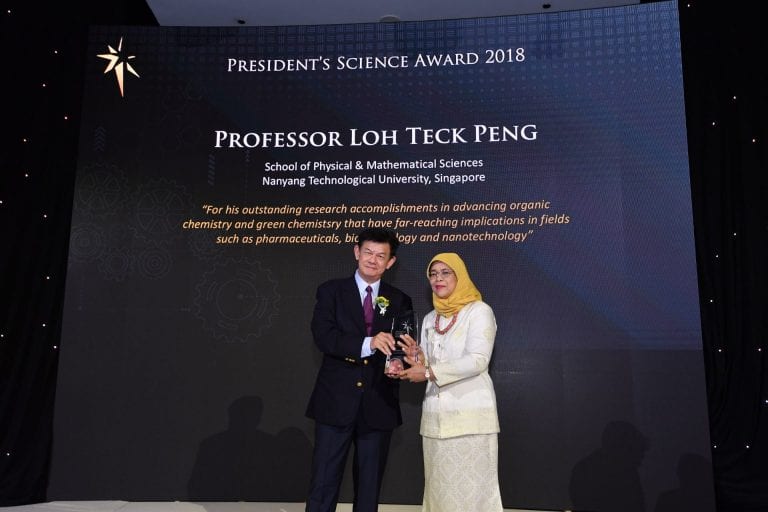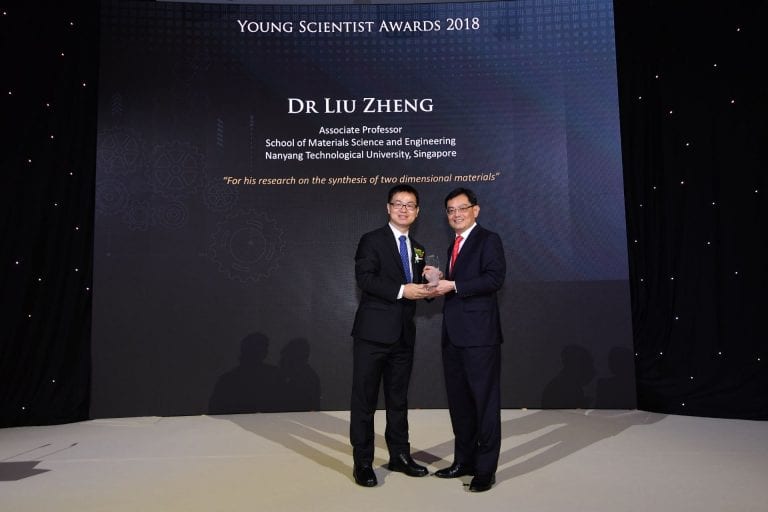Presidential honours for NTU researchers
Three NTU faculty have been recognised with Singapore’s highest honours for scientists and engineers, the President’s Science and Technology Awards.
Built on a strong foundation in science and engineering, NTU’s mission has always been to nurture outstanding researchers and innovators. The University’s investment in top talent has not gone unnoticed, with faculty bagging national and international awards.
Bestowed upon Singapore’s most exceptional research scientists and engineers, the annual President’s Science and Technology Awards were awarded this year to two of NTU’s faculty. Prof Lam Khin Yong, Senior Vice President (Research), was conferred the President’s Science and Technology Medal, the highest of the accolades, while Prof Loh Teck Peng of NTU’s School of Physical and Mathematical Sciences received the President’s Science Award (Individual).
At the awards ceremony graced by Singapore’s President, Madam Halimah Yacob, an up-and-coming NTU professor was also recognised with the Young Scientist Award. Assoc Prof Liu Zheng, of the School of Materials Science and Engineering, was one of three recipients of the award, which acknowledges the accomplishments and potential of researchers under 35.
Forging collaborations for a better Singapore
 NTU Senior Vice President (Research) Prof Lam Khin Yong. Credit: Agency for Science, Technology and Research, Singapore (A*STAR).
NTU Senior Vice President (Research) Prof Lam Khin Yong. Credit: Agency for Science, Technology and Research, Singapore (A*STAR).
A lifelong advocate of translational research, Prof Lam was honoured for his long-standing contributions and leadership in shaping the pool of scientific talent in Singapore and driving the University’s research efforts.
Prof Lam attributes much of this success to the “triple helix research collaboration model”, which involves finding mutually beneficial partnerships between three entities: a university, an industry partner and a public agency. NTU has adopted the triple helix model for industry engagements and the formation of on-campus corporate laboratories.
“This is a good arrangement especially when you want to encourage companies to work with the university on translational research, because it places all the stakeholders in near proximity to come up with a value proposition quickly,” says Prof Lam, who has spent over three decades in various roles pushing for scientific research that impacts society.
Having developed partnerships with corporate titans such as Rolls-Royce, Singtel, Surbana Jurong and most recently, HP Inc., Prof Lam notes that faculty inclusion through a “top-coordinated with ground support” system is a critical success factor, and emphasises that these partnerships would not have been possible without support from his colleagues.
 NTU Senior Vice President (Research) Prof Lam Khin Yong (left) receiving the President’s Science and Technology Medal from Singapore President Halimah Yacob. Credit: A*STAR.
NTU Senior Vice President (Research) Prof Lam Khin Yong (left) receiving the President’s Science and Technology Medal from Singapore President Halimah Yacob. Credit: A*STAR.
This philosophy of managing partnerships means that the initiative not only involves senior management, who negotiate with companies and government agencies, but also faculty members, as they are the ones conducting the research, he explains.
Though these translational research opportunities are important outcomes, Prof Lam emphasises that basic research remains a top priority as well. “We encourage our faculty to put in bids for basic research funding, which is vital. Many of the translational research projects we conduct also involve basic research,” he adds.
For his efforts in forging international academic alliances in research, Prof Lam was awarded the President’s Science and Technology Medal.
Going green through basic research
Also emphasising the importance of basic research is Prof Loh. “As researchers or scientists, we should try to tackle the fundamentals of science and change whole concepts rather than making
incremental progress,” he says.
 Prof Loh Teck Peng (left) with the President’s Science Award (Individual), presented by Singapore President Halimah Yacob. Credit: A*STAR.
Prof Loh Teck Peng (left) with the President’s Science Award (Individual), presented by Singapore President Halimah Yacob. Credit: A*STAR.
Prof Loh was recognised for the development of complex organic molecules with interesting biological activities, and for his role in cementing Singapore’s position as a leader in the field of synthetic chemistry over the last 20 years.
He is particularly enthusiastic about making chemical processes greener, to reduce our footprint on the environment. “What we mean by ‘green’ is that the by-product of the reaction is water, there is no organic solvent and the reaction is of ideal atom economy—which means all reactant atoms are found in the desired product,” Prof Loh explains.
He adds that his research group recently created a 100% green reaction where there was no trace of organic solvent left as a by-product of the reaction. The group also found that water was a catalyst for the reaction, and is now researching whether a water-promoted reaction can be created.
Small steps towards big innovations
Assoc Prof Liu’s research on 2D materials—made of a single layer of atoms—is also contributing towards a greener world.
“We realised that the 2D materials we are creating are very good at producing clean energy where the material can split water into hydrogen and oxygen,” Assoc Prof Liu explains. In the course of his research, he has devised a universal method of boosting the creating of 2D materials by simply adding sodium chloride. These enhanced materials could lead to smaller and faster transistors, photovoltaics, sensors and catalysts.
His group is currently studying transition metal dichalcogenides for applications in high-performance electronics and catalysis. “I intend to move my work to a higher plane by working on projects with direct benefits to society,” Assoc Prof Liu says.
 Assoc Prof Liu Zheng (left) accepting the Young Scientist Award from Singapore Minister for Finance Heng Swee Keat. Credit: A*STAR.
Assoc Prof Liu Zheng (left) accepting the Young Scientist Award from Singapore Minister for Finance Heng Swee Keat. Credit: A*STAR.



.tmb-listing.jpg?Culture=en&sfvrsn=370a7c71_1)

.tmb-listing.jpg?Culture=en&sfvrsn=29c7e020_1)
.tmb-listing.jpg?Culture=en&sfvrsn=ab6472c8_1)
.tmb-listing.jpg?Culture=en&sfvrsn=55153609_1)